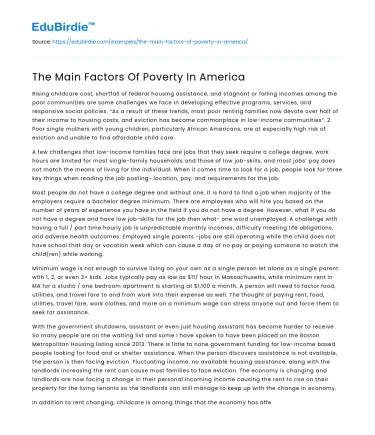Rising childcare cost, shortfall of federal housing assistance, and stagnant or falling incomes among the poor communities are some challenges we face in developing effective programs, services, and responsive social policies. “As a result of these trends, most poor renting families now devote over half of their income to housing costs, and eviction has become commonplace in low-income communities”. 2 Poor single mothers with young children, particularly African Americans, are at especially high risk of eviction and unable to find affordable child care.
A few challenges that low-income families face are jobs that they seek require a college degree, work hours are limited for most single-family households and those of low job-skills, and most jobs’ pay does not match the means of living for the individual. When it comes time to look for a job, people look for three key things when reading the job posting- location, pay, and requirements for the job.
Save your time!
We can take care of your essay
- Proper editing and formatting
- Free revision, title page, and bibliography
- Flexible prices and money-back guarantee
Most people do not have a college degree and without one, it is hard to find a job when majority of the employers require a bachelor degree minimum. There are employees who will hire you based on the number of years of experience you have in the field if you do not have a degree. However, what if you do not have a degree and have low job-skills for the job then what- one word unemployed. A challenge with having a full / part time hourly job is unpredictable monthly incomes, difficulty meeting life obligations, and adverse health outcomes. Employed single parents -jobs are still operating while the child does not have school that day or vacation week which can cause a day of no pay or paying someone to watch the child(ren) while working.
Minimum wage is not enough to survive living on your own as a single person let alone as a single parent with 1, 2, or even 3+ kids. Jobs typically pay as low as $11/ hour in Massachusetts, while minimum rent in MA for a studio / one bedroom apartment is starting at $1,100 a month. A person will need to factor food, utilities, and travel fare to and from work into their expense as well. The thought of paying rent, food, utilities, travel fare, work clothes, and more on a minimum wage can stress anyone out and force them to seek for assistance.
With the government shutdowns, assistant or even just housing assistant has become harder to receive. So many people are on the waiting list and some I have spoken to have been placed on the Boston Metropolitan Housing listing since 2013. There is little to none government funding for low-income based people looking for food and or shelter assistance. When the person discovers assistance is not available, the person is then facing eviction. Fluctuating income, no available housing assistance, along with the landlords increasing the rent can cause most families to face eviction. The economy is changing and landlords are now facing a change in their personal incoming income causing the rent to rise on their property for the living tenants so the landlords can still manage to keep up with the change in economy.
In addition to rent changing, childcare is among things that the economy has affected as well. The average cost of home daycare for an infant starts at $3,394 a year and goes up to $10,679 a year ($283 to $890 a month), but in large cities this cost is likely to be higher.3 In addition to rent changing, child care is among things that the economy has affected as well. With little to no childcare assistant available single parents struggle to find day care in their price range or in their distance if they can afford it. Sometimes it is a lose-lose situation and you have to figure out which one you can deal with longer.
In conclusion, we face challenges like rising childcare cost, shortfall of federal housing assistance, and stagnant or falling incomes among the poor communities due to the lack of support from the government for the communities in poverty. If the government took the time to visit the poor communities they will have a visual of what needs to change to have an idea of how to begin change. As well as, it is not only up to the government to make change – we in the community can make change within ourselves to spread change across.






 Stuck on your essay?
Stuck on your essay?

